Need we say more - our flagship collaboration with Jonny, Jorge & El Jaragual ran from 30/10/24 to 01/04/25. Returning this summer!
Having originally sold through a 3 month allocation in under a month, we’ve worked with Jonny for this fresh harvest to both build the blend directly at the dry mill in Colombia, and committed to higher volumes. We experimented with different combinations of varieties and ratios, before alighting right back to where we started as the best for this delightful coffee
Brew Guide:
Best Brewed with: Espresso, Immersion (Aeropress/French Press), Moka pot
Light-Medium Roaster Influence:
We've built the blend from coffees that shine with a heavier hand with the roaster influence. To make this coffee more suitable for espresso extraction, we're roasting with a touch more development (time in the roaster) - to shave off some acidity and emphasise sweetness and body, whilst also retaining the complexity inherent from the processing.
Best rested for: 2-3 weeks
For Filter: We recommend a ratio of 60-62g/L and 92°C water
For Espresso: 18g in, 45g out, 28-32s for a classic style of espresso.
We’re tasting:
Guava jam, vanilla pods, melon gummy sweets lead the top notes, mixed berry compote, caramel and apple underpin the cup.
Tastes like strawberry trifle in milk
Traceability:
Country of Origin: |
Colombia |
Region: |
Amalfi, Antioquia |
Farm: |
Finca El Jaragual |
Producer: |
Jorge Mira and Jonny Martinez |
Variety: |
66% Variedad Colombia, 34% Castillo |
Elevation: |
1500 MASL |
Process: |
Washed / Thermal Shock / Yeast Inoculated: Ripe cherries picked and floated, held in cherry for a 24-hour anoxic ferment in sealed barrels. Cherries are then pulped and washed with 45°C+ water to remove 80% of the mucilage, with the reduced mucilage parchment returned to barrels for a further 24-hour anoxic ferment. Cherries are then inoculated with wine yeast for a further 48-68 hour aerobic ferment, followed by a 5°C fermentation crash cold wash. Patio dried in a Solar Drier. |
Import Partner: |
MiCafe |
Harvest: |
Crop 24/25 - Harvested June 2024, Arrived UK: October 25th 2024 Second harvest purchasing from Jonny & Jorge at El Jaragual. |
The Story
When we first cupped the lots from Jonny’s farm, we knew his Rosado was an instant purchase for the filter range - but we also wanted to find a way to fit a second purchase in the offering. We contracted the Colombia lot for the intense sweetness, and additionally the Castillo upon receiving a fresh set of extra sample material (brought over with a re-supply when we air-freighted our first lot of the Rosado!). While filter lots can present a reasonable amount of volume, there are few things better for making larger volume commitments than espresso.
Having built our own interpretation of their work via blending 2 variety separations for the first season, we've worked with Jonny to build that blend upstream in Colombia for our second purchase and commited to future seasons working together. One of our largest single-origin purchases to date and one we can only see growing, hand in hand.
El Jaragual:
One of our sourcing goals with Scenery is to work with vertically integrated, producer owned supply chains where possible - and to not just follow trends with only buying the hottest name producers. Suffice to say we are firmly impressed with this first harvest from El Jaragual and expect the quality to only go up from here.
Finca El Jaragual sits at 1500 MASL in the Amalfi municipality of Antioquia, Colombia. This region is nestled in the northern section of the central spine of the Colombian Andes mountain range and is ideal for growing high quality coffee. The farm is named after Jaragua grass - an African wild-grass that has become naturalised to Colombia, frequently grown for feedstock and fodder, drought resistant and hardy.
Amalfi is a slightly less common area for coffee production, sitting further north than the “Triángulo del Café” regions of Caldas, Quindío, Risaralda and Tolima. While the conditions are still excellent to grow coffee, the issue becomes that of picking - whilst more classical regions with a higher density of farms will have a near constant supply of itinerant or seasonal labour, so far one of the biggest challenges at El Jaragual has been securing pickers. This challenge is exacerbated by climate change - the harvest is not as concentrated into the main and fly (mitaca) crop - instead trees flower and ripen nearly non-stop, requiring year round picking. It is essential that a farm picks and clears ripe cherries - an excess of over-ripe fruit on the trees or on the floor is a welcome invitation to broca, the coffee boring beetle - which damages the fruit and the young, immature seed inside. Keeping the trees clear of overripe fruit is one of the most effective non-agrochemical mechanisms to keep broca numbers down.
Originally a 150-hectare plot, the farm was briefly split as Jonny’s cousins acquired 90 HA about a decade ago. The remaining 60 HA were purchased by Jonny and his brother about 5 years back, in 2019 - with the work between now and then converting part of the farm back to coffee production and waiting eagerly for the first harvest.
The majority of El Jaragual is planted with forestry, thanks to Jonny’s cousin's experience as a forestry engineer. A mixture of pine forest plantations being grown for sustainable timber, alongside protected plots of native forest.
Jonny and Jorge are growing a number of varieties at El Jaragual, under plantain shade trees.
The processing at El Jaragual has been done with a deft touch - extended ferments, with yeast inoculation, and some thermal control (hot water washes, cold water crashes) to modulate the fermentation rate and green porosity.
Overall, an increased amount of technical intervention in the processing, but not on the level of bioreactors and lab plants - a really nice bridge between the classic style of processing and the new, something we can really get full throttle behind in supporting.

![[52] Colombia - El Jaragual Espresso [CROP 24/25 ARCHIVE]](http://scenery.coffee/cdn/shop/articles/colombia_el_jaragual_espresso_d491a823-78a5-467c-ab1a-adedcea29352.png?v=1744731862&width=1100)
![Colombia - Quebraditas Ají Thermal Shock Washed [FESTIVE SPECIAL] 🎄](http://scenery.coffee/cdn/shop/files/colombia_quebraditas_aji_shopify.png?v=1764358600&width=533)
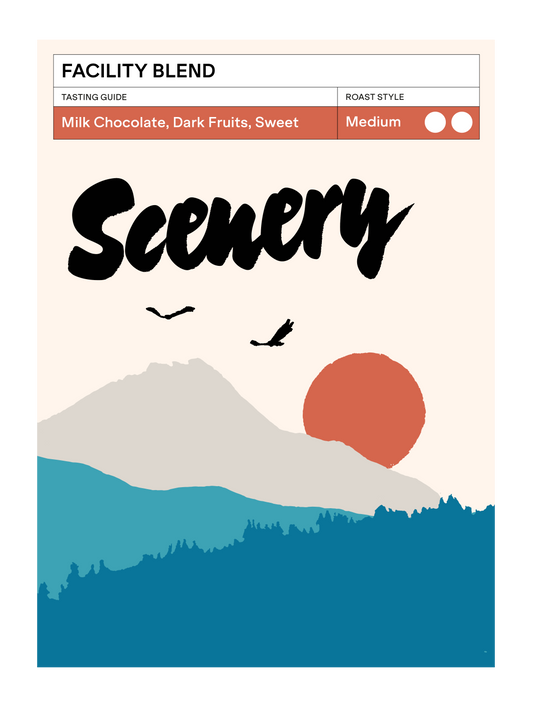
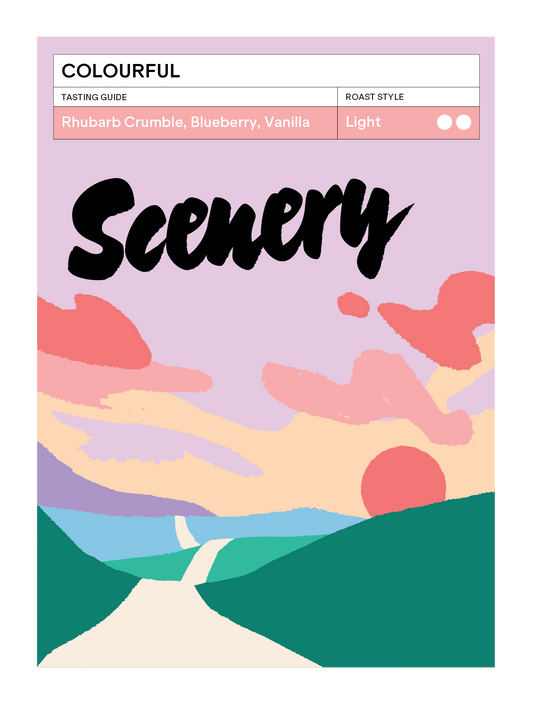
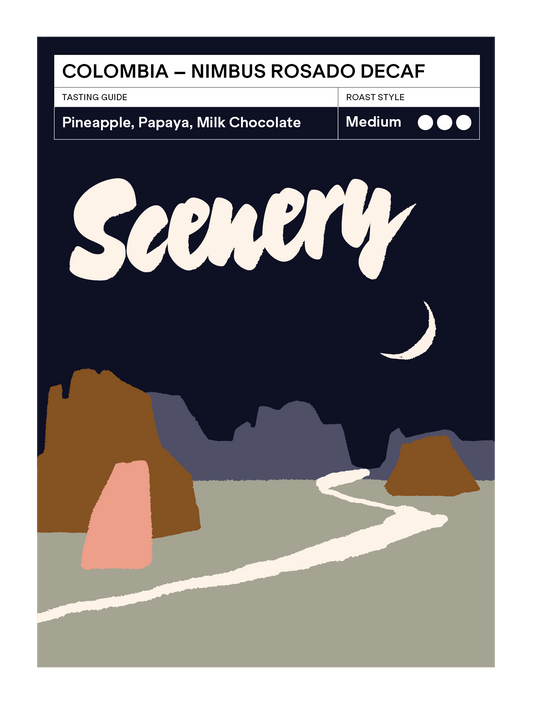

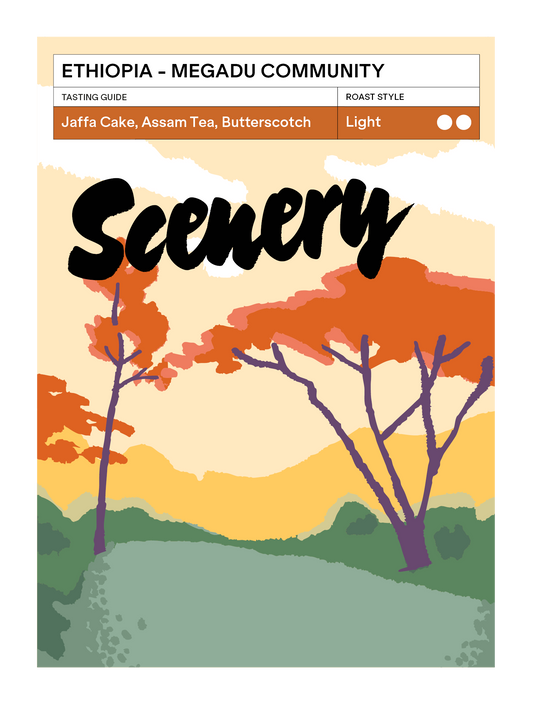


![Colombia - Luz Ángela's Chiroso [25/26]](http://scenery.coffee/cdn/shop/files/colombia_luz_angela_chiroso_2526_shopify.png?v=1764359755&width=533)


![Colombia - Quebraditas Gesha Thermal Shock Washed [25/26]](http://scenery.coffee/cdn/shop/files/colombia_quebraditas_gesha_2526_shopify.png?v=1761650288&width=533)
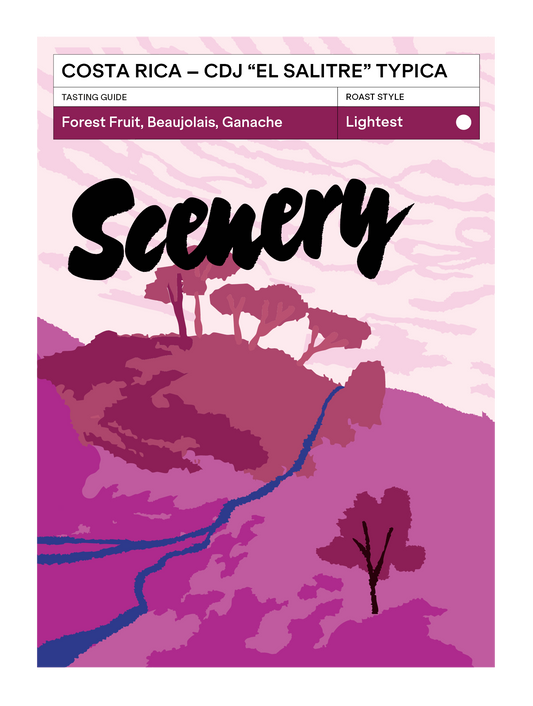
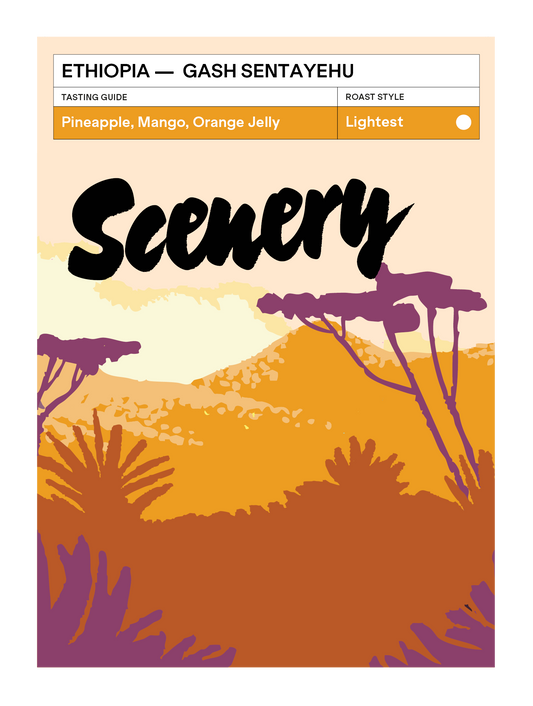
![Ethiopia - Rumudamo Natural [24/25]](http://scenery.coffee/cdn/shop/files/ethiopia_rumudamo_natural_shopify.png?v=1759952599&width=533)
![Colombia - El Jaragual Rosado [25/26]](http://scenery.coffee/cdn/shop/files/el_jaragual_rosado_2526.png?v=1757075842&width=533)